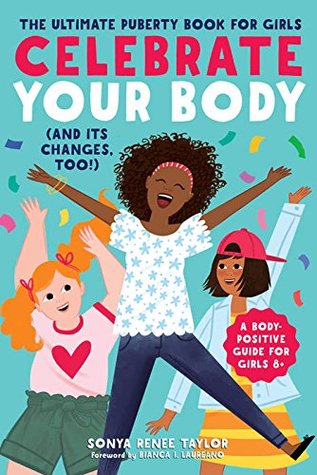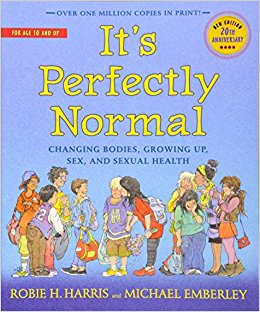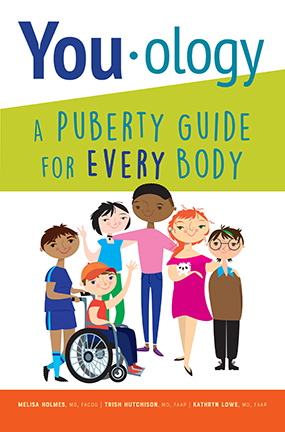Pimples and Periods: A Puberty Guide
This video goes through the physical, emotional, and social changes of puberty for people with a vulva. It addresses common changes like hair growth, getting a period, mood swings, new sexual feelings and hygiene as young people are on their way to becoming an adult. [AMZ-140]
Youth
If you’re between the ages of 8 and 13, you’ve probably started to experience puberty, or the changes that happen when your body starts to develop from being a child to a young adult. Then again, you may not have. Either way, don’t worry. Puberty can start as early as age 8 and as late as 13 or 14, but eventually everyone goes through it!
FAQs
There are no set changes that happen for everyone. Some people begin with growth spurts during which they grow taller. For others, the first sign may be that their breasts begin to grow or hair starts to grow under their arms and in their pubic area. Some people might notice they are getting more moody or might notice their hair is more oily. It’s all normal and happens to everyone as they go through puberty.
Some people might start to notice the changes of puberty beginning around the ages of 8-9 while for others, it might not begin until 12-13. There is a wide range of ages when a person can go through puberty and it usually takes 5-7 years for all of the changes to be complete. While it can feel like you’re the only one dealing with the changes of puberty, everyone goes through these changes, at their own pace in a way that is normal for their body.
People with a penis often begin puberty a little later than people with a vulva. Below are some common changes they go through during puberty:
- Growing hair on the face, under the arms and in the genital area
- Growing taller
- Broadening shoulders
- Deepening voice
- Having frequent, and at times, spontaneous erections
Possibly experiencing wet dreams, meaning ejaculating semen while sleeping. (This is normal if it happens and normal if it does not.)
Test your knowledge
Parents
All young people go through a process called puberty, during which their body experiences many changes in order to become an adult and biologically allow for the potential to reproduce. These changes usually occur between the ages of 8-13 and can take 5-7 years to complete.
For young people with a vulva, there are many physical, social and emotional changes that occur during puberty. These include breast growth, growth of pubic and underarm hair, a growth spurt impacting their height, weight and hips, mood swings, the desire for more privacy, along with getting a menstrual period.
Menstrual periods occur once a month and can last from a few days to a week. Some people have cramps during their periods while others do not. It’s important for everyone to understand that the first period signals the beginning of ovulation and their body’s ability to get pregnant if they were to have unprotected vaginal sex. Once a month, a hormone in the brain of people with a vulva, signals the ovaries to release an egg or ovum (a process called ovulation). The hormone estrogen is also released to signal the uterus to build up its lining. If an egg is not fertilized within 12 to 24 hours after ovulation, the egg dies and disintegrates while still in the uterine tube. Two weeks later, when the uterus realizes there is no fertilized egg, the built-up lining of the uterus is released or shed during a menstrual period.
There are many other physical, emotional and social changes of puberty as well. They may also experience acne, and their sweat may now have a strong odor. Other emotional changes during puberty can include mood swings, experiencing sexual feelings, being interested in other people in a new romantic and/or sexual way and often feeling a need for more privacy from parents and/or siblings.
It is important for caring adults to explain the changes of puberty to young people before and while they are going through them. It is also essential to assure them that these changes are normal and they are not alone. Helping young people identify ways to cope with these changes can make this stage of life less stressful. Talking about these changes with the young people in your life lets them know that they are not alone and can come to their parents or guardians if they have questions or need support.
Conversation Starters
It’s essential that you have conversations about topics like puberty if your child is to know that they can come to you with questions. The easiest way to start these conversations is to talk about issues as they come up in everyday life, like while watching TV or YouTube together.
Some topics, like masturbation, may not come up in regular conversation, but it’s important to bring them up anyway. During puberty, most young people begin to have new sexual feelings. Some begin to masturbate and some do not. It is normal if they do and also normal if they don’t and important that they know it can’t hurt their bodies physically.
Below are some ways to start these conversations:
When they mention a friend you know, you can say, “Wow, they have really developed this year. They are so much taller than last year.” You can then use this time to talk about how different people go through puberty at different ages.
When you get home and unpack the groceries, tell your child that you bought these for them. Explain that even if their period hasn’t started yet and that it may still be awhile, these supplies are here when they need them. You can go on to talk more about how to use them and/or tell them you are always there for them, whenever they want to talk more about these things.
Educators
All young people go through a process called puberty, during which their body experiences many changes in order to become an adult and biologically allow for the potential to reproduce. These changes usually occur between the ages of 8-13 and can take 5-7 years to complete.
For young people with a vulva, there are many physical, social and emotional changes that occur during puberty. These include breast growth, growth of pubic and underarm hair, a growth spurt impacting their height, weight and hips, mood swings, the desire for more privacy, along with getting a menstrual period.
Menstrual periods occur once a month and can last from a few days to a week. Some people have cramps during their periods while others do not. It’s important for everyone to understand that the first period signals the beginning of ovulation and their body’s ability to get pregnant if they were to have unprotected vaginal sex. Once a month, a hormone in the brain of people with a vulva, signals the ovaries to release an egg or ovum (a process called ovulation). The hormone estrogen is also released to signal the uterus to build up its lining. If an egg is not fertilized within 12 to 24 hours after ovulation, the egg dies and disintegrates while still in the uterine tube. Two weeks later, when the uterus realizes there is no fertilized egg, the built-up lining of the uterus is released or shed during a menstrual period.
There are many other physical, emotional and social changes of puberty as well. They may also experience acne, and their sweat may now have a strong odor. Other emotional changes during puberty can include mood swings, experiencing sexual feelings, being interested in other people in a new romantic and/or sexual way and often feeling a need for more privacy from parents and/or siblings.
It is important for educators and other caring adults to explain the changes of puberty to young people before and while they are going through them. It is also essential to assure them that these changes are normal and they are not alone. Helping students identify ways to cope with these changes can make this stage of life less stressful. Talking about these changes with your students lets them know that they are not alone and can talk with a trusted adult like a parent/caregiver or other adults, if they have questions or need support.
National Sex Ed Standards
Explain the physical, social, and emotional changes that occur during puberty and adolescence and how the onset and progression of puberty can vary
Describe how puberty prepares human bodies for the potential to reproduce and that some healthy people have conditions that impact the ability to reproduce
Explain common human sexual development and the role of hormones (e.g., romantic and sexual feelings, masturbation, mood swings, timing of pubertal onset)
International Technical Guidance on Sexuality Education
Discussion Questions
- What are some green flags of a healthy relationship?
- What are some examples of yellow flags of a relationship?
- What are some examples of behaviors (red flags) that might signal a relationship is unhealthy?
- What are some things you can do if you feel like a relationship is not healthy?
- What is one example of a break-up plan?
- What can a person do if they think they might be dealing with intimate partner or teen dating violence?
- Who could you contact if you, or a friend, were dealing with an unhealthy relationship, intimate partner or teen dating violence?



